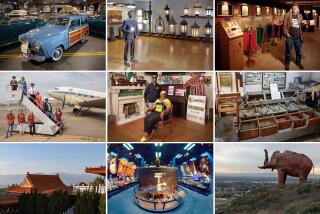C. Wright, 83; Father of Black Museums
- Share via
Charles H. Wright, a Detroit obstetrician and gynecologist who gave birth to Detroit’s first African American history museum in the mid-1960s, has died. He was 83.
Wright, considered the father of the national movement to establish African American museums, died of a heart attack March 7 in the Detroit suburb of Southfield.
Wright created the International Afro-American Museum in a Detroit row house where he lived and worked in 1965, donating $1,000 a month to pay for a small staff and costs.
Inspired by a memorial for Danish World War II heroes in Copenhagen, Wright believed that African Americans needed to connect with their history and celebrate black heroes.
“I’d bring healthy babies into the world and I’d see them later and they’d be psychologically scarred,” Wright told the Detroit Free Press in 1997. “I saw we had to do something about society--and the museum was an effort to do that.”
Wright’s daughter Stephanie Wright Griggs said her father founded the museum “to inspire people to have a greater sense of self-pride.”
“He was always concerned about African Americans having self-esteem,” she said. “He wanted to counter some of the negative stereotypes we have about ourselves, and he felt very strongly that there was a lot to be proud of.”
Wright could not have envisioned that his small museum, which originally housed its exhibits in a trailer that traveled to schools and state fairs, would one day become the world’s largest African American history museum.
Forming a partnership with the city of Detroit, the renamed Museum of African American History opened in a new 28,000-square-foot building in the city’s University Cultural Center in 1987.
With voter-approved construction bonds, a third, 120,000-square-foot museum opened in 1997; a year later it was formally rededicated and renamed the Charles H. Wright Museum of African American History.
The museum is anchored by a permanent exhibit that educates visitors on African civilization, the “Middle Passage” taken by slave ships bound for America, the Underground Railroad and the civil-rights movement of the 1950s and ‘60s.
The museum and its annual African World Festival in August draw more than 1 million visitors a year.
“Dr. Wright was a dreamer, but he had the fortitude and the passion and was blessed with the ability to get others to believe his dream, and that’s his legacy,” said Harry Harrison, a museum vice president.
The son of a clergyman, Wright was born in Dothan, Ala. He earned a bachelor’s degree from Alabama State College (now University) in 1939 and graduated from Meharry Medical College in 1943.
Wright, who interned at Harlem Hospital, began a private practice in obstetrics and gynecology in Detroit in 1953. Before retiring in 1986, he delivered more than 7,000 babies.
When he wasn’t delivering babies, Wright was active in the civil-rights movement.
He provided medical services to marchers in Selma, Ala., and Bogalusa, La., in the ‘60s. And Wright, who never lost his light, melodious Alabama drawl, encouraged other physicians to support and donate money for social causes, including the African Medical Education fund, which helped Africans studying in the United States.
In Detroit, he led protests on various issues, including eliminating segregation policies at a Detroit women’s hospital that prevented black obstetricians from delivering the babies of patients they admitted.
“He basically said, ‘If I admit [a patient], I will deliver my babies,’” said his daughter.
“He would fight discrimination, if it existed, with anybody,” said Robert Shannon, former museum board president. “He’s a great reason the hospitals in Detroit are as equal as they are.”
When her father first started the African American history museum, Griggs said, he did everything from fund-raising to recording oral histories.
Concerned that African American history wasn’t always accurately recorded, Wright believed that the only way to get it down correctly “was to document and record your own history,” said his daughter.
“I’d go around with him in those days, and he’d interview people and say, ‘These people need to be recorded for history,’” she said.
Wright wrote several plays, including “Were You There?,” a morality play about making the right choices in life. He wrote several books, including “Paul Robeson: Labor’s Forgotten Champion.”
Under Wright’s leadership, the museum and Detroit’s public high school principals established the Paul Robeson Scholarship. Wright was one of the founders of the Assn. of African American Museums.
“My whole life has been a continuous quest for freedom,” he once wrote.
In addition to Griggs, Wright is survived by his wife, Roberta; his daughter Dr. Carla Wright; two stepchildren, Wilbur Hughes III and Barbara Smith; and one granddaughter.
More to Read
Sign up for The Wild
We’ll help you find the best places to hike, bike and run, as well as the perfect silent spots for meditation and yoga.
You may occasionally receive promotional content from the Los Angeles Times.






